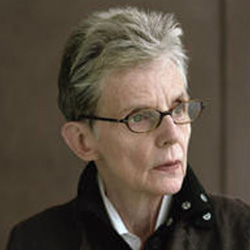Closed book who stole
who away do brackets
signify emptiness was
is a rift in experience
Mackerel and porpoise
was this the last of us
These tallied scraps float
like glass skiffs quietly for
love or pity and all that
What an idea in such a time
as ours Pip among Pleiads
…
If to sense you are
alive is pleasant itself
or can be nearly so –
If I knew what it is
I’d show it – but no
What I lack is myself
Notes on the Poem
This disarmingly spare excerpt from Susan Howe's 2018 Griffin Poetry Prize-winning collection Debths offers numerous entry points and various paths by which to approach it. Let's look at one way to explore the poem's intriguing depths / debts / deaths, as the judges' citation suggests. Throughout our weekly considerations of poems from Griffin Poetry Prize shortlisted and winning works, we've regularly pondered the connections between those poems and their titles. (This is just one of many examples.) Can the title "Periscope" give us any insights? "A periscope is an optical instrument that allows objects that are not in direct line of sight to be viewed. Periscopes have proven to be of great help to submariners by allowing these professions to have a view above the surface of water and aid in navigation under water." The description from this source goes on to describe how types of periscopes range in complexity, with simple ones constructed using mirrors and more sophisticated ones employing prisms. With this in mind, does the title help to interpret the poem as we venture into it? A periscope allows us to see something not directly in our line of sight, so does that help to comprehend something not readily apparent in the poem? For example, what is the closed book withholding? We might argue that brackets don't necessarily signify emptiness, but enclose parenthetical information about something - not directly related, perhaps out of context, but certainly something, not a void. What do those floating scraps, tallied or noted, indicate? Certainly, that image evokes the surface of water, which we've just learned periscopes can help to transcend and navigate. Is there a connection here? These notes on "The Close Reading of Poetry" from the English Department of the University of Victoria, have a few things to say about using titles as a guide into a poem. The notes offer, in a somewhat impatient tone, examples of titles that don't seem to help or shed light on the poems to which they're attached. The notes ask, perhaps provocatively: "Does the title immediately influence what you are about to read, or does it, at the moment you begin your first reading, remain mysterious or vague?" Did the title here helped to elucidate Susan Howe's work, or was this perhaps not the path down which to head?
